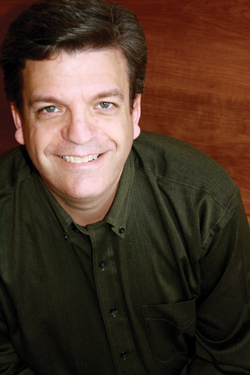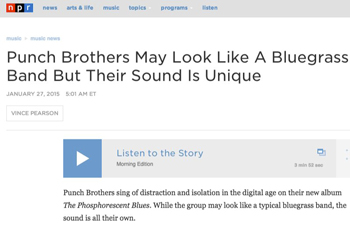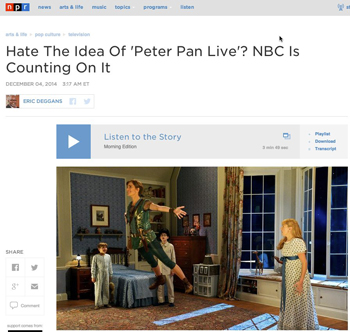What's New > Allen Henderson - On Hate Watching and Hate Listening
 |
By Allen Henderson
NATS Executive Director
How many of you love to listen to your own recordings? I must admit it has never been one of my favorite things. Learning to listen critically is an indispensable skill for the singer. It is often through recording ourselves in lessons, practice, and performance, and reviewing those recordings, that we discover and correct faults, review the platitudes and pronouncements of our teachers and coaches, and the subtle nudges that made a marked positive difference in tone, resonance, or shape of phrase.
Prior to the internet revolution, many of us used the ancient technology of cassette tape (I will avoid even earlier technologies) to record our sessions for later review. Following a lesson we might have pulled the cassette out several times and
popped it in a box called a tape player and rewound the cassette to listen to our lesson,  indexing important counter numbers for later ease of reference (having trouble following me? See the image on the left side of this page or visit https://en.wikipedia.org/wiki/Cassette_deck). Some of us kept journals with our reactions and reviews of the recordings and through this repeated process chronicled the progress of our vocal development.
indexing important counter numbers for later ease of reference (having trouble following me? See the image on the left side of this page or visit https://en.wikipedia.org/wiki/Cassette_deck). Some of us kept journals with our reactions and reviews of the recordings and through this repeated process chronicled the progress of our vocal development.
Acquiring the skill of critical listening was a gradual process. Sometimes reviewing a recording with out teacher revealed further nuances that we missed even after multiple hearings on our own. As we combined this skill with our other learned and innate musical skills our ability to discern what we perceived as quality singing was influenced by a host of other stimuli and the complex skill of rating a performance or a portion of it was imprinted upon us. Those inclined toward a positive outlook might first consider the good things about the performance but let’s face it, usually when listening we gravitate toward the mistakes made or the less than perfect aspects of the performance. We often have to tell ourselves prior to starting the playback, ‘I am only going to list the positive things about the performance the first time through’ or one might gravitate toward the critical. Expanding this process of listening to recordings of other singers, the exceptional and the average, and combining that with an ever expanding database of knowledge acquired through our in depth study, we continually refine our ability to evaluate the voices we hear. We come to expect a certain level of performance when a new recording by __________(insert favorite singer’s name) is released and we hear it for the first time. Sometimes our expectations are exceeded and sometimes they are not met and we form an opinion.
Historically our colleagues who have made a professional career in music criticism also have carefully listened multiple times to a newly issued recording, written and rewritten their reviews, sometimes put them away and returned to them a few days later, and produced a final submission to their editor for publication. These reviews have the benefit of time. Time to listen, time to absorb, time to process and formulate, and time to respond responsibly and thoughtfully. Once published the review was distributed and readers absorbed this opinion as they considered purchasing a recording or buying a ticket to a performance. When leaving a performance we would often hear those discussing the positives and negatives of performances in the lobby as they left the performance sometimes musing, “I wonder what _____________ will say in his review in the Times tomorrow?”
Fast-forward to today and the world of music criticism has seemingly morphed into everyone’s job. Technology, society, and the economics of print journalism have unfortunately ravaged a career path once revered by many and the number of employed professional music critics has dwindled to very few. The ability to receive and give instant feedback on social media and in other venues has often short-circuited the process of acquiring deep and broad critical listening skills by the young and altered the evaluative process for those who developed those skills prior to the technology explosion. One unfortunate result of this is the phenomenon known as hate-listening or hate-watching. Technology now allows us to comment on every phrase a singer sings in a performance literally while he or she is taking a breath for the next one. Gone is the time to absorb a performance of an entire song, cycle, or opera unless a conscious choice is made to untether ourselves from electronic devices. Last year when The Sound of Music was broadcast live on television, the impact of this hit home as I watched and chronicled the reaction of those in my social media circles at all levels of musical aptitude. Comments ranged from the astute to the crass. I found myself caught a bit off guard by some of the petty and irrelevant criticism posted and actually found my attention divided between what was happening on stage and what was happening on social media. So much so that I closed my social media pages and reviewed the remainder of comments after the performance. As I later reviewed posts, I found a broad mix of responses many of which I would classify of the hate-watching variety. Imagine my concern this year when Peter Pan was being promoted and a segment appeared on NPR’ Morning Edition entitled “Hate the Idea of ‘Peter Pan Live’? NBC is Counting on It.”
How do we as music professionals respond to this epidemic that threatens to cheapen and sometimes unfairly denigrate the art forms and colleagues we respect and admire?
How do we respond to the old adage ‘everyone’s a critic’ when everyone REALLY DOES become a critic? Most importantly how do we model informed behavior and educate those we teach to be informed critics in this new media landscape? Allow me to offer some suggestions.
How Do We Respond?
Modeling appropriate social media behavior is as imperative today as modeling and teaching appropriate audience behavior for recitals has been in the past. Just as we would not clap in the middle of a song cycle, we need to resist the urge to comment in the middle of a performance.
“Measure twice and cut once,” is a phrase my father repeats every time we work on a woodworking project together. “Think twice and comment once (or not at all)” might be an alternative for our discussion here. After drafting a comment, reread it, ask yourself “Is this a valid comment/criticism?” — “Is it contributing to the conversation?”
 When we take our focus away from a performance in order to comment our attention is divided and we miss a portion of the performance. In a recent interview, the mandolin player and singer Chris Thile of Punch Brothers talked about the title of their new album, The Phosphorescent Blues.
When we take our focus away from a performance in order to comment our attention is divided and we miss a portion of the performance. In a recent interview, the mandolin player and singer Chris Thile of Punch Brothers talked about the title of their new album, The Phosphorescent Blues.
The album title was inspired by the ghostly blue glow that appears on the faces of many in their audiences while using their cellphones during performances. Thile lamented the fact that audiences seem less connected to the performance when using their phone. “People look like ghosts from stage, and they kind of are ghosts. In a way, they’re not really there, and that’s kind of how we are all right now. We’re never really all the way anywhere.” If we expect our students to be fully engaged as performers, let’s also expect them to be fully engaged listeners and audience members and expect that of ourselves as well.
Let’s reclaim the joy of simply enjoying a performance live or recorded. As teachers we spend our days critically evaluating everything we hear in the studio. As a result it is often hard to turn off the critical ear when we attend a performance. We need to consciously remind ourselves that we are there to simply take in the performance and enjoy live music being made. We need to practice this and instill in our students the ability to do so as well.
In 2012 the NEA and the Knight Foundation recognized the changing environment of arts journalism and arts criticism through the creation of a new grant program. The NEA Chair was quoted saying, “To succeed, art requires informed and engaged audiences, and those audiences require news, criticism, and information on a regular basis.”
In an article in The Guardian in 2013 Ismene Brown wrote, “But arts organizations are contributing to the demolition [of arts criticism]. Facing grant cuts, many of them are diving in panic into social media, feverishly filtering their feeds for “Wow, amazing!!!!” times 30, rather than looking for two or three discriminating reviews that actually study the work on offer, its impact on the soul, its place among human achievements. Appreciation means to increase the value of something. Critics do that by explaining whether an event was worth the public’s time and that each of us has the right to expect much of an artist from our own point of view.”
While we all think we are well-educated musicians, our “classical” music training hardly prepared us for accurately dissecting the nuances of a rock performance by Steven Tyler as discussed by Dr. Stephen Zeitels last summer in Boston at our national conference. Yet we feel free to post comments about rock singers’ performances and others outside our expert sphere of knowledge that then become interpreted by those in our sphere of influence as comments by an expert. While our comments about a recent performance of Mozart may be expert, often our comments on rock are truly more about our personal reaction to the music as a listener/fan and not of an informed critic on that genre. While we probably understand the difference, those in our sphere of influence may not.
Idina Menzel’s recent highly publicized performances of her hit “Let it Go” and the National Anthem are good lessons for us all. While some of us may feel less comfortable talking expertly about super belt and high belt singing I feel I can state with certainty that we have all been in a high pressure performing situation and had our voice not perform optimally. Yet my social media feeds contained few to no comments of camaraderie like “been there, done that,” “I feel your pain,” etc. Let’s support our colleagues when they are down rather than celebrating their less than triumphant moments as if our comment is the one to crack a perfectly crafted media persona.
We know we are in a new media landscape and that professional arts criticism is losing a battle in the newsroom. We should also realize that we as artists ourselves must be part of the solution by raising the bar for ourselves and future colleagues we train each day. While writing this article, a well-informed blog post/review of Matthew Polenzani’s recital at Alice Tully Hall by NATS member Daniel Shigo appeared on my Facebook feed. In my mind this is an excellent example of informed criticism by someone who is not a professional music critic. Allow me to break down the qualities I think we can all aspire to:
He writes about that of which he has expert knowledge.
He writes supportively of the profession but also compares Polenzani’s attributes to what he sees as lacking in some other contemporaries he has heard. I imagine that had Polenzani not exceeded his expectations on this front that he would have also stated his reservations about the performance just as eloquently.
He writes well-formed sentences that are not full of exclamations like “awesome,” “wow,” etc.
He leaves the reader better informed about the subject being reviewed.
Just because we are not professional music critics, does not mean we cannot write informed criticism well and contribute to others’ understanding of our art form while building up, supporting, and sometimes protecting the profession we love. Each of the above qualities can easily be turned into a question we or our students can ask when thinking about posting about a topic on social media.
Am I commenting as an informed expert on this matter or a “fan?”
Are my comments supportive of the profession as a whole and if critical are they well-stated?
Are my comments well written?
Will my comments inform? Will they further the discussion on a topic? Although they may be contrary to previous opinion are they defensible?
I leave you with the words of the great composer and lyricist Stephen Sondheim
“Careful the things you say, children will listen.”
I look forward to reading YOUR well-informed criticism this year. Find me on FaceBook at Allen Henderson or one of our NATS Social Media pages listed on nats.org.
As always, I welcome your comments - either by e-mail or in the comments section at the bottom of this page.
Posts
 |
Allpharmacy Shaboff
by Shaboff
posted on 6:32 PM, April 15, 2018 |
 |
Acquistare Priligy Elladdire
by Ellligo
posted on 7:06 AM, October 14, 2019 |
| back |


